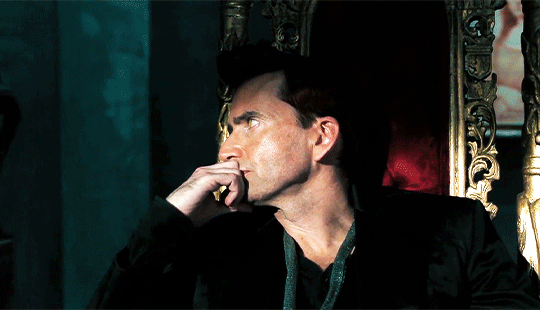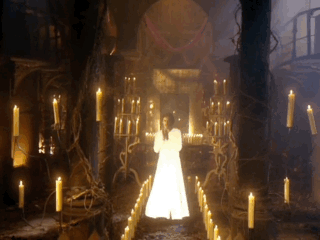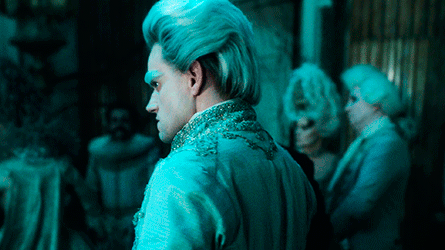#Counterfactual
Text
What might evil!Aziraphale be like?
My first meta! Woo! Mostly just trying to articulate some of my brain's particularly weird recent wiggles, but still!
So I was re-reading Neverwhere recently, and something about the way the Angel Islington is portrayed reminded me of That Smile In The Credits and got me wondering... What might Aziraphale be like if he turned evil? (I do mean legitimately *evil* -- Falling in the GO verse has nothing to do with the subject's morality)

I know, Crowley, it's a scary and depressing thought! It's also never going to happen -- I feel quite confident about that -- but exploring counterfactual scenarios can help get a different perspective on things, maybe even illuminate what's likely to happen in the future! (as well as being dang interesting in their own right)
So, then, on with the motley! (caution: big ol' spoilers for both Neverwhere and Susanna Clarke's Jonathan Strange & Mr Norrell below the cut)
Now, it's always possible to turn 'good' characters 'evil' by having them act out a set of generically 'evil' traits, but that'd be boring and liable to be out of character. A more interesting route would be to simply turn up the dial(s) on one or more of a character's traits (especially their flaws) and see what happens!
Even the most die-hard Aziraphale fan has got to admit that our favourite fluffy bookseller has a bit of a problem with self-righteousness, so that seems like a good place to start. Notch the dial up to max, and what do we get?
Very likely, something similar to this:

(Peter Capaldi as the Angel Islington, Neverwhere, 1996)
The Angel Islington! Unshakably self-righteous to the point of insanity? Oh yes -- to the point of justifying committing genocide by screaming that "THEY DESERVED IT!!!" for not providing the proper worship, and generally so being utterly convinced of its own rightness that traditional morality is discarded as irrelevant (quoth Mr Croup, "He's travelled so far beyond right and wrong he couldn't see them with a telescope on a nice clear night.").
There're other parallels between Islington and Aziraphale, too -- primarily the proliferation of light/pale colours in their costuming and having a mild, kindly, soft-spoken manner (genuine with Aziraphale, a mere veneer with Islington) but also their (planning to) return to Heaven. In Islington's case, it was cast out as punishment for annihilating Atlantis and seeks to return and enact a hostile takeover and become a new God; in Azzy's case, of course, he was railroaded into returning against his will (and may or may not be plotting Undercover Shenanigans to Save The World, but that's a bit beyond the scope of this meta). Nevertheless, the parallels are there, noticeable enough to make me think that Islington represents what Aziraphale might become in the worst of all possible worst-case scenarios (especially where his religious trauma and Heaven's fanaticism and propaganda are concerned).
(As a side note, this whole idea of (self-)righteousness leading to great evil is also reminiscent of why Gandalf flatly refused to take custody of the One Ring -- fear of doing great evil while attempting to enact great good.)
So that's the self-righteousness angle, but maybe there're other angles -- perhaps we could leave the SR dial alone and instead see what happens if we dial Azzy's hedonistic tendencies and one or two others up to eleven!
I hear pipes and drums and dancing, endless faerie balls within the brugh...

(Marc Warren as The Gentleman With Thistledown Hair, Jonathan Strange & Mr Norrell, 2015 (BBC adaptation))
Behold, the ruler of Lost-hope, this faerie gentleman with hair the colour of thistle-down! He's the most significant antagonistic force in Susanna Clarke's 2005 novel Jonathan Strange & Mr Norrell, and has a few interesting parallels with Aziraphale.
First and most obviously, there's the hair colour! Secondly, we have the fact that they're incalculably old immortal beings with considerable magical/mystical power, as well as notions of morality, ethics etc that are to some degree orthogonal to human understanding of such matters. There's also the hedonistic tendencies -- Aziraphale's are comparatively subtle, mainly revolving around appreciating Earthly pleasures like food, drink and music, but if exaggerated could easily end up like the Gentleman's tendency to focus on his own fun/amusement, regardless of the cost to others.
Which ties in to one of the most noticeable parallels, something that you might have worked out already if you've come this far and/or are already familiar with JS&MN -- the Gentleman spends a good amount of time abducting or planning to abduct beautiful humans to be enchanted to dance forever in endless balls within his kingdom of Lost-hope. Doesn't that sound uncomfortably similar to the Shopkeepers' Association Ball in S2E5? The parallel certainly gave me a moment of the shivering heebie-jeebies when I spotted it -- regardless of Aziraphale's motivation there, he absolutely comes off almost like one of the Fair Folk (likely even in-universe!); it's very easy to imagine that he could get like the Gentleman if he 'takes the brakes off', so to speak.
So there we have it -- an evil!Aziraphale would likely be similar to the Angel Islington, the Gentleman With Thistledown Hair or possibly some terrifying and unholy hybrid of the two.
Or something else entirely that I can't find adequate words for!
Now, I must emphasise that just because I've put a good deal of thought into exploring the 'evil!Aziraphale' idea, it doesn't mean I think it'll happen; on the contrary, I'm convinced that it never will. For one thing, regardless of the parallels noted above, Aziraphale is far more fundamentally benevolent than either Islington or the Gentleman. Despite his flaws, he is at heart a genuinely good, kind, decent, compassionate person. Some folks, the Metatron among them, are going to interpret this as weakness or stupidity, which is wholly incorrect -- Azzy is very intelligent (while also being a bit of a dumbass, granted -- the two are not mutually exclusive) and has a steel core of courage, protectiveness and badassery (comparisons to Magrat Garlick would be entirely valid here). He understands the concept of 'guardian angel' better, I'd wager, than the whole of the rest of the Heavenly Host (or at least the leadership thereof). And in underestimating him, railroading him back to Heaven and trying to force him to actively plan the destruction of everything he holds dear (sheer sadism probably being at least part of the MT's motivation there), the Metatron has (on a silver platter) handed our adorable fluffy little tartan murder hornet the means, motive and opportunity to Seriously Fuck Shit Up for Heaven >:D
Plus, Neil Gaiman loves and respects Aziraphale as much as we do, and is WAY too good a writer and storyteller to randomly gratuitously derail such an interestingly complex character's development arc! Besides, we were promised a South Downs cottage. SOUTH DOWNS COTTAGE!!! THE SETS ARE STILL STANDING IN BATHGATE!!!!!
*ahem*
As a palate cleanser, a bit of food for thought: given that demons tend to have animal motifs, in the unlikely event of Azzy capital-F Falling, would he be an angora rabbit or a big fluffy cat?


#good omens#good omens meta#aziraphale#neverwhere#islington#angel islington#jonathan strange and mr norrell#gentleman with thistledown hair#counterfactual#analysis#character analysis
10 notes
·
View notes
Text
Alternate history where the formula for guncotton (nitrocellulose, also smokeless powder) was discovered in the early Renaissance. It is a decent amount more explosive than gunpowder, in that it has about 30% more energy and burns way more cleanly. It was also possible given technology of the time.
What would be interesting is that it would allow significantly higher charges than the metallurgy would be able to handle. Even at the time, overcharging the cannons (and handguns) would lead to explosions (and petard hoisting), so having an even better explosion wouldn't make for stronger cannons than was possible at the time. It might allow riffling earlier because of reduced fouling, but mostly just makes the guns easier to use.
What would change? I think you might get explosive shells earlier, although as I understand it, getting high explosive shells to not be shock sensitive in the initial firing was a considerable challenge that folks may not have been up to pre-19th century. More likely, you'd get increased use of mines, barrel charges, and grenades earlier.
But there would also be an expanded civilian use, I think. Gunpowder was used in metal mining, but it isn't all that great. But Nobel invented dynamite because of its civilian uses. So I could see there being enhanced infrastructure, like clearing of cataracts, earlier in history than we ended up with. (Funny result: some of the cataracts that were great for water-power of mills are cleaned up, so Lowell Massachusetts doesn't end up a textile center). You might also have a higher access to metal ore than in the counterfactual.
Ultimately, not much would change, though, I think.
11 notes
·
View notes
Text
top 5 roman deaths that could have changed the world
5. quintus fabius maximus verrucosus
hannibal is rampaging across italy, destroying every army the romans raise against him in humiliating defeats. fabian becomes dictator and proceeds to do... nothing. but it works and just keeping a roman army in the field without leading them all to their deaths is important. other commanders adopt his strategy of not engaging unless victory is certain. probably he's why rome survives the second punic war and eventually is able to go on to win it. what if instead he had been assassinated for his 'cowardice' or 'treason' in refusing to confront hannibal head on. what if instead the roman empire had died in the cradle and the carthaginian empire had been born, having conquered its greatest rival.
4. marcus licinius crassus
imagine the dude kicks the bucket on the eve of his debacle in parthia. instead of leading these men and his son to their deaths in the desert sands, the army is mustered and ready to march off but he dies and his son takes over instead. would he have made the same disastrous mistakes as his father or would he have returned to rome a conquering hero greater than gaius julius?
3. constantine the great
diocletian had all his ducks in a row with the previous emperors retiring and their caesars rising to the rank of co-augusti. but constantine (and others who felt their right to inherit the empire was being unduly ignored, but constantine was most successful) is here to fuck all that up. suppose instead he gets trounced at the milvian bridge and even dies or is captured (and then executed). maybe diocletian's succession sticks and becomes a precedent where every 10 years the augusti step down and their caesars step up. and more importantly, maybe the empire never becomes christian.
2. irene of athens
what if instead of blinding her own son and damning her line she had instead kicked the bucket and let the seemingly capable emperor take full control? this period is so wild and so scant for sources that it's even harder to imagine how this counterfactual might play out than any of the others but certainly blinding and killing your only heir isn't a strong play.
antoninus pius
he was supposed to keep the seat warm after hadrian died until marcus aurelis could take over as a capable and long-reigning man. but the 54-year-old kept on kicking for another 23 years, keeping marcus bottled up in the capital with him. even assuming shit still hits the fan upon his death and rome is attacked by those who had been peaceful under the capable emperors hadrian and antoninus pius, rome might have been better able to fend it off a decade earlier. because a decade later a plague was making fighting a war and keeping the army supplied and manned a debilitating task, especially for a man who spend 23 years essentially bookkeeping alongside the emperor.
#ancient rome#roman empire#byzantine empire#what if#counterfactual#pretty light on the byzantines#but these are the what ifs I personally wonder the most about
7 notes
·
View notes
Text
Also, I just had a weird but funny idea: If I were a man and had daughters who were Swifties and we were going to see Taylor on tour, I’d totally let them put me in Tom Hiddleston’s “I ❤️ T. S.” tanktop for the show. I can only imagine the reaction from all the kids.
11 notes
·
View notes
Audio
The fifth instalment of our mix series is a killer from York based Counterfactual!
#centralbeatz#central beatz#counterfactual#drum n bass#drum and bass#dnb music#dnb mix#Drum'n'Bass#drum and bass mix
2 notes
·
View notes
Text
youtube
TODAY IN PHILOSOPHY OF HISTORY
Arnold Toynbee and Thought Experiments in Civilization
Sunday 14 April 2024 is the 135th anniversary of the birth of Arnold Joseph Toynbee (14 April 1889 – 22 October 1975), who was born in London on this date in 1889.
Toynbee is one of the most influential figures in philosophy of history, though neither historians nor philosophers want to claim him for their own. His epic multi-volume A Study of History, which brought him fame during the mid-twentieth century, is now little more than a curiosity. His scholarship is both praised as epoch-making and condemned as shoddy. Do we still have something to learn from Toynbee today?
Quora: https://philosophyofhistory.quora.com/
Discord: https://discord.gg/r3dudQvGxD
Links: https://jnnielsen.carrd.co/
Newsletter: http://eepurl.com/dMh0_-/
Text post: https://geopolicraticus.substack.com/p/arnold-toynbee-and-thought-experiments
Video: https://youtu.be/7YKupH54j3c
Podcast: https://podcasters.spotify.com/pod/show/nick-nielsen94/episodes/Arnold-Toynbee-and-Thought-Experiments-in-Civilization-e2icem0
#philosophy of history#youtube#Arnold Toynbee#A Study of History#counterfactual#thought experiment#civilization#Youtube
0 notes
Text
This is a choropleth series from the National Library of Scotland in a timeline where James VI never became King of England and the 1707 Act of Union never took place. Scotland remained independent, historically allied with nations like France, Aragon, and Norway.
It depicts which of the official languages of Scotland is the primary one used at home as reported in the national census of 2020. The four official languages are Scottis, Erse, Norn, and Inglis, known as Scottish, Gaelic, Norish, and English by speakers of the final one.
(I have this 'Kingdom of Burgundy' timeline where Mary of Burgundy, daughter of Charles the Bold marries Nicholas, eventual Duke of Lorraine, and thanks to the Lorrainer influence there are no conflicts with the Old Swiss Confederacy and Charles the Bold does successfully get the Kingdom of Burgundy under the HRE that had been promised to him but reneged upon, and this map is in the modern day of that ATL, maybe.)
0 notes
Text
the English word "could" (and closely related equivalents like "can") has two disconnected regions of meaning:
probabilistic possibility, i.e. "X can Y" iff your predictive world-model/understanding of what will happen assigns non-negligible subjective probability to X doing Y, which doesn't apply after X's opportunity to Y passes
e.g. "it could rain tomorrow" in that i don't know whether it will rain tomorrow, so i assign that case non-negligible probability
counterfactual possibility, i.e. "X can Y", whether or not X actually did or will Y, iff changing things to make X do Y would take a convincing-type action rather than a teaching-/resource-providing-type action
e.g. "i could beat up my friends" in that getting me to beat up my friends would require arguing with/manipulating me so as to override my moral preferences, which takes a lot, but is all it would take (i know how to beat people up, tho not very well)
confusion can arise when an event is possible in one sense but not the other (usually, this takes the form of P-impossible but C-possible)
e.g. "i couldn't beat up my friends" in that as far as i can tell, no one will manipulate me so effectively as to do that, so i assign that action negligible probability
0 notes
Text
One of the many problems with the idea (which, as best I can tell, originated in a 4Chan post) espoused by racists that some people can't comprehend counterfactuals is that it entails a very reductive understanding of what a counterfactual is. If I refrain from touching a hot stove, I am in fact contemplating a counterfactual, namely that, if I did touch it, my hand would be burned; this is a basic facet of human cognition, if not of animal cognition, and it would be impossible to function without it.
0 notes
Text
alternate universe where instead of "glass half full" and "glass half empty" optimism and pessimism are expressed by the phrases "trapped in the labyrinth" and "still solving the labyrinth"
6K notes
·
View notes
Text











i want to live.
jonathan safran foer, extremely loud and incredibly close || sylvia plath, the bell jar || robert frost, the road not taken || t.s. eliot, the love song of j. alfred prufrock || everything everywhere all at once || doc luben, love letters or suicide notes || wikipedia || john greenleaf whittier || hamilton: the musical, who lives who dies who tells your story || mary oliver, the summer day || carlos ramirez, the fig tree
#web weaving#my weavings#on life#on choices#jonathan safran foer#sylvia plath#robert frost#t s eliot#everything everywhere all at once#doc luben#counterfactual thinking#john greenleaf whittier#hamilton#mary oliver#carlos ramirez
1K notes
·
View notes
Text
John Simm once again celebrated DW day with Master of Puppets (bless him and his music taste) over a series of Master photos and

WTF IS THAT PHOTO I'VE NEVER SEEN IT BEFORE HE LOOKS LIKE HE'S SINGING MUSIC OF THE NIGHT AT CHRISTINE!TARDIS (TEN IS JEALOUS) JUST LOOK AT THAT LIL' TOP TIER TENOR BEAN FACE
#i should also make a graph of how both the post and the counterfactual that he wouldn't post anything would suggest he gets a cameo#it pleases me deeply that people in the comments are tagging rtd to bring him back#i feel old men tensimm would heal me a deeper spiritual kevel#anyway#doctor who#doctor who day#the master#simm!master#john simm#harold saxon
183 notes
·
View notes
Text
I've been thinking about mules, and how fucked up the Discourse™ would be if humans and some other sapient hominid were in the same situation as horses and donkeys. The chromosomal mismatch (horses have 64, donkeys 62, mules 63) renders their offspring infertile and bring out some "primitive" traits not commonly expressed by their parents-- imagine what might happen in the development of a sapient creature.
Can you imagine how fucked up the fight for equality in marriage, sex rights, etc. would be? Would it be justifiable to have a child with your partner, knowing said child will suffer the consequences for your actions? Full scale eugenics is probably off the table for ethical reasons, but would it not also be unethical to bring into the word a child guaranteed to be infertile, developmentally delayed, or unable to live longer than their parents? The fight for LGBTQ+ rights has been ridiculously difficult, and there's literally no downsides. The debate over the rights for Human-46s and Human-48s to get it on would be terrifying.
It only matters in cases where pregnancy is a concern, but we all know how fucked everything about normal birth control is. How bad would your offspring need to have it for mandatory sterilization to be on the table? The dating scene for straight people would be so fucking dystopian. Sure, you like this guy, but do you like him enough to get a hysterectomy? Are you sure he's the one? That you won't fall apart in three years? That you won't find yourself with someone of the same species, craving children of your own, but unable because of a decision you made as drunk college kid? It matters less if you're gay/straight but one of you is trans/otherwise unable to produce a child via raw-dogging, but I trying to envisage the discourse around "The government forced me to tie my tubes even though my partner tops" makes me feel ill.
Growing up as a Human-47 would also have to suck -- knowing your parents cared more about a five second orgasm than the fifty years you get to spend knowing you're inferior to both of them. "Was it really worth it, Mom?" you ask. "Did he make you cum well enough to offset my fifth-grade reading level?"
The flip side is also bad: what if Human-47s were better than their parents, but still infertile. Are you so committed to the survival of your species that you're willing to forgo that hybrid vigor? Is it more important to you that your child produce sperm/eggs than be capable of true, total self-actualization? Do you you love your spouse enough to (relatively) stunt your children? On the flip side, is your child's success more important than letting them raise a family? Growing up Human-46/48, especially if you don't even want kinds, can you forgive your parents for their choice? Can a wanting Human-47 mother or father forgive their parents?
Not trying to draw explicit parallels with real-world issues here, and I think most of these questions aren't too hard to find good solutions to-- but I've been turning this idea over in my head like a rotisserie chicken for months and I think it might kill me if I don't get it out.
96 notes
·
View notes
Text
Not sure I care enough to engage with the post, but to read SVSSS + extras and come away with the interpretation that SJ doesn't care about why YQY failed to save him, just that he did fail, and therefore would never forgive him or change his behavior towards him if he learned the truth, feels off-place to me. It seems to lean into the view that SJ doesn't actually care about YQY, just sees him as a useful tool, and thus couldn't be hurt by the supposed abandonment - with that interpretation it would then make sense to think he would neither care nor change his behavior (towards YQY) upon learning what actually happened.
#generously put - I suppose it's not an interpretation that the text of svsss completely forbids#but I don't see it as the most probable interpretation by a long shot and it doesn't explain their interactions or themes well at all#given that Shen Jiu eventually canonically forgives YQY even without an explanation I don't see why he wouldn't if one was earnestly given#I could see SJ continuing to throw some lingering degree of fit if he learned that YQY had indeed tried but failed#(and YQY honestly doesn't need to elaborate on the whole trauma only the important part - that he set out too late)#but I really don't think their relationship would have been anything like how it turned out in canon#no real comment on how SJ's actions would change on ~everything else~ since it's so counterfactual after that point and we know he's a git#I do honestly feel that the novel bolsters this idea with the whole thing at Maigu Ridge#where SY learns of YQY's tragedy and immediately sees what he has to do to avert the same with LBH#he saw how important it was to explicitly let LBH know how loved he is even if he can't explain everything because it CAN change things#and it does for them#the responsibility part is... well everyone is responsible for their own behavior - including SJ#now I don't have strong opinions on this next part#but regardless of trauma or his right to remain silent - YQY has some responsibility for the ~direct~ consequences of the choice he made#namely referring to SJ's belief that he was callously abandoned and his pain and anger over it#but he is absolutely not responsible for SJ's “everything else”#idk just had some thoughts
20 notes
·
View notes
Text
the urge to self sabotage bc it would be easier. BUT I WONT DO IT!! I NEED TO PROVE TO MYSELF THAT I CAN DO THINGS THAT ARE GOOD FOR ME!
#i have a history of like. wanting to take the hard path and when its Actually Hard instead of#going thru w it i just like...dont do anything. usually i become anxious to the point of illness etc etc#but rn its like...i cannot fuck this up fr i rly have to at least try !! ive been given a good thing i have to at least . try.#i need to be nicer to my future self they are just as much a person as any of my friends that id go out of my way for#by that point we may so different from each other that all the bad things i do that harm my future arent just harming MY future#but also someone distinct from me in many ways. yk. like who are u hurting ? they (future u) may be a stranger at that point#with how much things change. do you have a right to rob them of potential health and happiness?#im not trying to play around w counterfactuals i just need to be kind. i just need to be kind even if its myself.#lets see.
65 notes
·
View notes
Text
I feel like theodicy is the place that (post-Plato? post-Zoroaster?) Abrahamic religions tend to really fail as systems of thought.
Like, spiritualism in general tends to be unpersuasive as a question of fact- there's simply no real empirical support for it, even though the construction itself is often powerfully evocative and beautiful. But the matter of evil in Christianity, Islam, Mormonism, etc. is something else, a place where this subset of religious doctrines just has visible and painful problems on its own merits. It's not just that I don't accept the factual claims- it's that the arguments don't add up at all. Theodicy is the crux where you have to fundamentally choose between doctrinal fidelity and the pursuit of truth, because it's where the doctrine is facially, deductively inconsistent and wrong.
At the end of the day, you just can't propose a flawless and omnipotent designer of the cosmos while simultaneously making evil a centerpiece of your analysis. You can be Manichean, and have evil arise from not-God or from some limit God has. You can assert that evil doesn't exist, though that can be tricky: Plato's evil-as-absence thing was largely unsuccessful as an attempt, both because positive evils like pain are regular features of human experience, and because pure deprivation as an ontology of evil still doesn't solve the theodicy problem. But what you cannot do is assert that the foundation of the cosmos is a perfect and all powerful entity incapable of error, and also that evil exists. The toddler's hand is well and truly caught in the cookie jar.
Most forms of modern Christianity and Mormonism try to use free will to thread the needle; mainstream Islam I think is a bit more Leibnizean, though it still leans hard on human culpability. But you can't actually do this! The claim, of course, is to say that the setting of the cosmos is perfectly good, that human volition itself is also perfectly good, but that volition has the special quality of sometimes (though not intrinsically) producing evil, which we all then have to deal with. But there's nothing in free will that actually makes it a suitable solution to this problem. The deity is necessarily extratemporal, and in that frame, volition lacks the special properties it would need to hold this weight; when you can flip to the end of the book any time you like, there's no such thing as indeterminism. Every human choice has one and exactly one result, just as with any other domain of reality; free will, like gravity and electromagnetism, is a process with wholly knowable outcomes. Hence, 'free will' is (in the context of monotheism) a purely linguistic construction that means only 'the consequences of this process are not God's fault.' It has no properties other than the shift in culpability itself, no proposed mechanism or relationship to other phenomena, no inherent virtues that can be explained in terms of any moral system. It's an entirely circular argument, a way to credit God for very tall apple trees but blame somebody else for the invention of applesauce.
#Not saying that free will itself isn't real in some sense#but I am saying that if the God Of Abraham is real#or even ontologically possible#then free will is not a form of indeterminacy#there is only one future#and it is singular#the counterfactual futures are as irrelevant to morality as they are to physics#because there is no such thing as 'might have been'#only the necessary and inevitable attributes of a known cosmos
37 notes
·
View notes